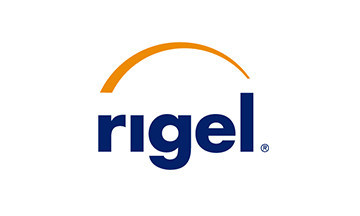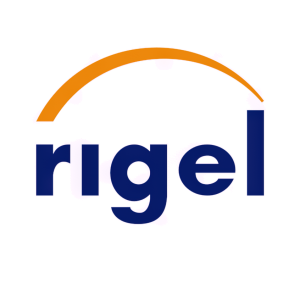Data from NIH/NHLBI-Sponsored Phase 2 Trial of Fostamatinib in Hospitalized COVID-19 Patients Published in Clinical Infectious Diseases
Rigel Pharmaceuticals (Nasdaq: RIGL) announced the publication of Phase 2 clinical trial results for fostamatinib in treating hospitalized COVID-19 patients. Conducted in collaboration with NIH's NHLBI, the trial involved 59 patients and showed that fostamatinib, when added to standard care, led to fewer serious adverse events and improved clinical outcomes. Key findings indicated a reduction in mortality rates, ICU stay duration, and time on supplemental oxygen compared to placebo. A larger Phase 3 trial is set to further validate these findings.
- Fostamatinib demonstrated a 50% reduction in the incidence of serious adverse events compared to placebo.
- Zero deaths reported in the fostamatinib group versus three in the placebo group.
- Reduced median ICU stay by 4 days in the fostamatinib group.
- Patients on fostamatinib had fewer days on oxygen (8 vs. 20 days in placebo).
- Improved clinical status assessed by Day 15 compared to placebo.
- The study was not powered to confirm clinical efficacy.
- Results show a p-value of 0.2, indicating limited statistical significance.
Insights
Analyzing...
SOUTH SAN FRANCISCO, Calif., Sept. 1, 2021 /PRNewswire/ -- Rigel Pharmaceuticals, Inc. (Nasdaq: RIGL), today announced the publication of results from a Phase 2 clinical trial evaluating the safety of fostamatinib for the treatment of hospitalized patients with COVID-19, in Clinical Infectious Diseases, an official publication of the Infectious Disease Society of America. The study was sponsored by the National Heart, Lung, and Blood Institute (NHLBI), part of the National Institutes of Health (NIH), in collaboration with Inova Health System.
"As cases of COVID continue to surge across the world, improved therapies for patients hospitalized with COVID-19 are urgently needed," said Richard Childs, M.D., Clinical Director of the NHLBI at the NIH. "We are encouraged to see that for COVID-19 patients requiring hospitalization, fostamatinib in combination with the standard of care was shown to be well tolerated in the study. Patients treated with fostamatinib not only had less severe adverse events, but were observed to have improved clinical outcomes compared to those receiving placebo and standard of care."
The results from the 59 patient Phase 2 trial demonstrated that the addition of fostamatinib to standard of care (SOC), which included the antiviral remdesivir and the steroid dexamethasone, was well tolerated and associated with clinically meaningful improvement in clinical outcomes in hospitalized COVID-19 patients who required supplemental oxygen. While the study was not powered to test clinical efficacy, numerous prespecified secondary endpoints consistently favored fostamatinib, including mortality, time to sustained recovery, change in ordinal scale assessment, number of days on oxygen, and number of days in the ICU, suggesting that fostamatinib may provide an additional therapeutic benefit compared to current SOC alone.
"It's reassuring to see that fostamatinib demonstrated a consistently well-tolerated safety profile for hospitalized patients with COVID-19 in this trial," said Jeffrey R. Strich, M.D., principal investigator of the study and a physician at the NIH Clinical Center. "Additional studies are needed to confirm the efficacy findings and show how fostamatinib may address the dysregulated immune response observed in COVID-19 patients."
Results were published online in a manuscript titled "Fostamatinib for the treatment of hospitalized adults with COVD-19, A randomized trial" and can be accessed here: https://doi.org/10.1093/cid/ciab732.
Key findings within the fostamatinib Phase 2 trial include:
- The study met the primary endpoint showing fostamatinib did not increase the incidence of serious adverse events (SAEs) compared with placebo.
-
The overall incidence of SAEs by Day 29 was approximately
50% less in the fostamatinib group (10.5% ) compared with the placebo group (22.0% ) (p=0.2) . The most frequent SAE reported by Day 29 was hypoxia, occurring in 1 patient receiving fostamatinib and 3 patients receiving placebo. - At Day 29, in the overall population there were zero deaths in the fostamatinib group compared to 3 in the placebo group (p=0.07). In more severe patients (ordinal scale 6 or 7), the difference was 0/19 patients in the fostamatinib group compared to 3/17 patients in the placebo group (p=0.049).
- There were 4 intubated patients in the trial on mechanical ventilation (ordinal scale 7) upon enrollment with 2 patients randomized to each treatment group. Both patients in the fostamatinib group were extubated and discharged from the hospital, while both patients in the placebo group deceased.
- The median number of days in the ICU was reduced by 4 days, from 7 days (IQR* 2-10) in the placebo group to 3 days (IQR 2-5) in the fostamatinib group (p=0.07).
- The median number of days on oxygen was 8 (IQR 5-10) in the fostamatinib group compared to 20 (IQR 14-27) in the placebo group (p=0.2). The difference was even greater in more severe patients with the fostamatinib group at 10 days compared to placebo at 28 days (p=0.027).
-
At Day 15,
65.5% of patients were free of supplemental oxygen in the fostamatinib group compared to39.9% in the placebo group (p=0.08). In more severe patients, the difference was57.9% compared to20% (p=0.016). - Fostamatinib was superior to placebo in accelerating improvement in clinical status from baseline by Day 15 (mean change -3.6 + 0.3 vs. -2.6 + 0.4; p=0.035) using ordinal scale assessments.
- The median time to recovery was 8 days in both groups. The greatest benefits were observed in more severe patients where the median time to recovery was reduced from 13 days (IQR 11-19) in the placebo group to 10 days (IQR 6-13) in the fostamatinib group.
- Despite general SOC use of both steroids and remdesivir in all 59 patients, there was a consistently greater reduction in NETosis and other inflammatory biomarkers (CRP, Ferritin, D-Dimer, Fibrinogen) in the fostamatinib group compared to the placebo group.
*IQR = Interquartile Range, is the range of the first and third quartiles of the range as a measure of spread.
"With the need remaining so great, we are very pleased with the growing body of evidence that suggests fostamatinib may provide clinical benefit for those patients hospitalized with COVID-19," said Raul Rodriguez, president and CEO of Rigel. "Our larger Phase 3 clinical trial in COVID-19, which we expect to complete later this year, will provide us with further understanding of the safety and efficacy of fostamatinib and its potential as a new therapy for these patients."
Phase 2 Clinical Trial Design
The Phase 2 double-blind, placebo-controlled clinical trial sponsored by the NHLBI, part of the NIH, in collaboration with Inova Health System, enrolled fifty-nine hospitalized patients with COVID-19 who were a 5 to 7 on the 8-point ordinal scale (requiring supplemental oxygen via nasal cannula or non-invasive ventilation, requiring mechanical ventilation or extracorporeal membrane oxygenation). Patients were randomly assigned to one of two cohorts: fostamatinib plus SOC and matched placebo plus SOC (1:1). Treatment was administered orally twice daily for 14 days, with a follow-up period through day 60. The primary outcome was the cumulative incidence of SAEs by Day 29. Notably, all patients received dexamethasone (or other steroid) and remdesivir.
About Clinical Infectious Diseases
Clinical Infectious Diseases is a leading journal in the field of infectious diseases with a broad international readership. The journal publishes articles on a variety of subjects of interest to practitioners and researchers. Topics range from clinical descriptions of infections, public health, microbiology, and immunology to the prevention of infection, the evaluation of current and novel treatments, and the promotion of optimal practices for diagnosis and treatment. Clinical Infectious Diseases is an official publication of the Infectious Diseases Society of America. Learn more at https://academic.oup.com/cid.
About Rigel
Rigel Pharmaceuticals, Inc., is a biotechnology company dedicated to discovering, developing, and providing novel small molecule drugs that significantly improve the lives of patients with hematologic disorders, cancer, and rare immune diseases. Rigel's pioneering research focuses on signaling pathways that are critical to disease mechanisms. The company's first FDA-approved product is TAVALISSE® (fostamatinib disodium hexahydrate) tablets, the only oral spleen tyrosine kinase (SYK) inhibitor for the treatment of adult patients with chronic immune thrombocytopenia who have had an insufficient response to a previous treatment. The product is also commercially available in Europe (TAVLESSE) and Canada (TAVALISSE) for the treatment of chronic immune thrombocytopenia in adult patients.
Fostamatinib is currently being studied in a Phase 3 clinical trial (NCT03764618) for the treatment of warm autoimmune hemolytic anemia (wAIHA)1; a Phase 3 clinical trial (NCT04629703) for the treatment of hospitalized high-risk patients with mild-to-moderate COVID-191; an NIH/NHLBI-sponsored Phase 3 ACTIV-4 Host Tissue Study for the treatment of COVID-19 in hospitalized patients on oxygen therapy, and a Phase 2 clinical trial for the treatment of COVID-19 being conducted by Imperial College London.
Rigel's other clinical programs include its interleukin receptor-associated kinase (IRAK) inhibitor program, and a receptor-interacting serine/threonine-protein kinase (RIP1) inhibitor program in clinical development with partner Eli Lilly and Company. In addition, Rigel has product candidates in development with partners AstraZeneca, BerGenBio ASA, and Daiichi Sankyo.
For further information, visit www.rigel.com or follow us on Twitter or LinkedIn.
Please see www.TAVALISSEUSPI.com for the full Prescribing Information.
1. The product for this use or indication is investigational and has not been proven safe or effective by any regulatory authority.
Forward Looking Statements
This press release and other publicly available documents, including the documents incorporated herein by reference, contain " forward-looking statements" within the meaning of the safe harbor provisions of the U.S. Private Securities Litigation Reform Act of 1995. Examples of forward-looking statements include statements relating to, among other things, the continuing need for therapies to treat the health impacts and complications from COVID-19; the plans of Rigel and other parties to complete further confirmatory studies of fostamatinib's safety and efficacy in COVID-19 patients; and Rigel's plans to seek regulatory and marketing approvals of fostamatinib's use for treating COVID-19 patients. Forward-looking statements can be identified by words such as "plan", "potential", "may", "expects", "will" and similar expressions in reference to future periods. Forward-looking statements are neither historical facts nor assurances of future performance. Instead, they are based on Rigel's current beliefs, expectations, and assumptions regarding the future of our business, future plans and strategies, projections, anticipated events and trends, the economy and other future conditions, and hence they inherently involve significant risks, uncertainties and changes in circumstances that are difficult to predict and many of which are outside of our control. Therefore, you should not rely on any of these forward-looking statements. Actual results and the timing of events could differ materially from those anticipated in such forward looking statements as a result of these risks and uncertainties, which include, without limitation, risks and uncertainties associated with whether there is an ongoing need for COVID-19 therapies; risks that the FDA, EMA or other regulatory authorities may make adverse decisions regarding fostamatinib; risks that fostamatinib clinical trials may not be predictive of real-world results or of results in subsequent clinical trials; risks that fostamatinib may have unintended side effects, adverse reactions or incidents of misuses; the availability of resources to develop Rigel's product candidates; market competition; as well as other risks detailed from time to time in Rigel's reports filed with the Securities and Exchange Commission, including its Quarterly Report on Form 10-Q for the quarter ended June 30, 2021. Any forward-looking statement made by us in this press release is based only on information currently available to us and speaks only as of the date on which it is made. Rigel does not undertake any obligation to update forward-looking statements, whether written or oral, that may be made from time to time, whether as a result of new information, future developments or otherwise, and expressly disclaims any obligation or undertaking to release publicly any updates or revisions to any forward-looking statements contained herein.
Contacts:
For Investors
Jodi Sievers – Rigel Pharmaceuticals
Phone: 650.624.1232
Email: ir@rigel.com
For Media
Emily Correia – Syneos Health
Phone: 508.314.3157
Email: emily.correia@syneoshealth.com
![]() View original content to download multimedia:https://www.prnewswire.com/news-releases/data-from-nihnhlbi-sponsored-phase-2-trial-of-fostamatinib-in-hospitalized-covid-19-patients-published-in-clinical-infectious-diseases-301366914.html
View original content to download multimedia:https://www.prnewswire.com/news-releases/data-from-nihnhlbi-sponsored-phase-2-trial-of-fostamatinib-in-hospitalized-covid-19-patients-published-in-clinical-infectious-diseases-301366914.html
SOURCE Rigel Pharmaceuticals, Inc.








